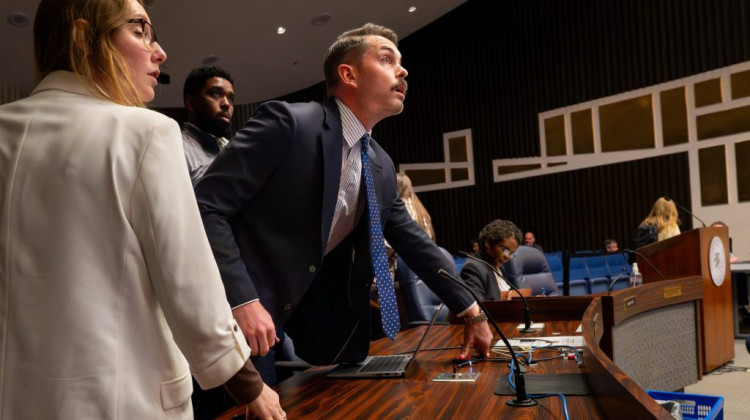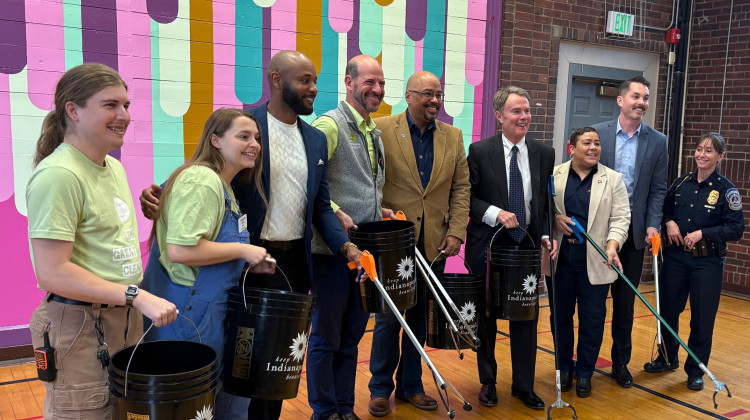
Indianapolis documentary filmmaker Don Sawyer has a new movie exploring solutions to homelessness.
WFYI News / Ben ThorpDocumentarian Don Sawyer debuted his latest film this month, a search for solutions to homelessness around the country called Beyond the Bridge. It's a follow-up to his documentary Under the Bridge, which focused on Indianapolis.
Reporter Ben Thorp sat down with Sawyer to discuss what he found around the country, and how it compares with potential solutions in our state capital.
Ben Thorp: Your upcoming documentary looks at solutions to homelessness and travels the country speaking to people in cities that have reduced homelessness, particularly Houston and Milwaukee. Can you talk to me about what you found?
Don Sawyer: We found that there's no community in the country that can't eliminate homelessness in their communities. The problem is that all the institutions where homelessness touches, like law enforcement, the judicial system, the healthcare system, all of it, do not work together most of the time.
What happened in Milwaukee and in Houston is they all sat down and said, where is the problem here? And they said, 'Well, it's because we don't work together.' And so they just community collaboration, they cooperate with each other, they work within one system. And it works. They've reduced homelessness by amazing amounts.
Thorp: Yeah, Milwaukee in particular, you know, one of the stats that I've seen is a 92% reduction in chronically unhoused individuals since 2015, the city used a model called Housing First, which works to get people off the streets by immediately getting them housed. Talk to me about how that system works.
Sawyer: Well, you know, the people that you see on the street that you avoid, as you're walking down the street, you know, people who might be yelling at things that no one can see except them, you know, just people that you think are hopeless. Housing First was created for those folks. Those folks never have a chance to get housed in the old systems, because it's a compliance-based, earn-your-way-to-housing system.
So Housing First looked at that, and said, This is failing. What everybody deserves is a roof over their head, what everybody needs is a roof over their head for stability, in order to get to a place where you can actually improve and bring the services to them. Give them a case manager, if the organization doesn't have those services, then the case manager navigates them through the system.
As long as they have support services, you can't just put them in housing without support services. That's a recipe for failure. But if you give them support services, and you support them and give them dignity and respect, like everybody expects, then the the outcomes are off the charts.
Thorp: You know, obviously your 2015 documentary, Under the Bridge, looked at the criminalization of homelessness here in Indianapolis, maybe you can talk about, you know, where you think the state of things is here in the city in handling and managing homelessness.
Sawyer: Indianapolis is not unique in its fragmented approach to addressing homelessness, and that is why Indianapolis is not better at it. Milwaukee is a twin city it basically has the same makeup and it's in the Midwest or three hours away. Indianapolis could easily top Milwaukee and what they're doing.
The problem here in the problem, like most places around the country, is a lack of leadership. Leadership has to happen from the top in order, it has to be an agenda item that we're going to solve this problem.
We're not going to just get them out of the way, we're not going to just hide them. We're not going to just build a big shelter like they're trying to do here and stick them in away from downtown so nobody wants to look at them. Those are typical responses that have been proven failures over since the 80s.
Thorp: Thank you so much for taking the time to talk to me.
Sawyer: You're welcome.
Indianapolis has implemented Housing First policies for the past several years using federal and local funding to house people. The city also has a Continuum of Care where stakeholders partner to address homelessness.
WFYI reached out to the city to discuss its adoption of Housing First policies. Coverage of this issue is ongoing.
 DONATE
DONATE






 Support WFYI. We can't do it without you.
Support WFYI. We can't do it without you.